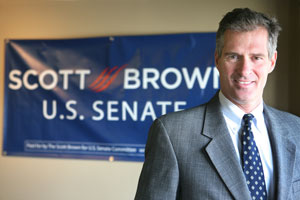
US House of Representatives/<a href = "http://en.wikipedia.org/wiki/File:Bob_inglis.jpg">Wikimedia Commons</a>
It was the middle of a tough primary contest, and Rep. Bob Inglis (R-S.C.) had convened a small meeting with donors who had contributed thousands of dollars to his previous campaigns. But this year, as Inglis faced a challenge from tea party-backed Republican candidates claiming Inglis wasn’t sufficiently conservative, these donors hadn’t ponied up. Inglis’ task: Get them back on the team. “They were upset with me,” Inglis recalls. “They are all Glenn Beck watchers.” About 90 minutes into the meeting, as he remembers it, “They say, ‘Bob, what don’t you get? Barack Obama is a socialist, communist Marxist who wants to destroy the American economy so he can take over as dictator. Health care is part of that. And he wants to open up the Mexican border and turn [the US] into a Muslim nation.'” Inglis didn’t know how to respond.
As he tells this story, the veteran lawmaker is sitting in his congressional office, which he will have to vacate in a few months. On June 22, he was defeated in the primary runoff by Spartanburg County 7th Circuit Solicitor Trey Gowdy, who had assailed Inglis for supposedly straying from his conservative roots, pointing to his vote for the bank bailout and against George W. Bush’s surge in Iraq. Inglis, who served six years in Congress during the 1990s as a conservative firebrand before being reelected to the House in 2004, had also ticked off right-wingers in the state’s 4th Congressional District by urging tea-party activists to “turn Glenn Beck off” and by calling on Rep. Joe Wilson (R-S.C.) to apologize for shouting “You lie!” at Obama during the president’s State of the Union address. For this, Inglis, who boasts (literally) a 93 percent lifetime rating from the American Conservative Union, received the wrath of the tea party, losing to Gowdy 71 to 29 percent. In the weeks since, Inglis has criticized Republican House leaders for acquiescing to a poisonous, tea party-driven “demagoguery” that he believes will undermine the GOP’s long-term credibility. And he’s freely recounting his frustrating interactions with tea party types, while noting that Republican leaders are pushing rhetoric tainted with racism, that conservative activists are dabbling in anti-Semitic conspiracy theory nonsense, and that Sarah Palin celebrates ignorance.
The week after that meeting with his past funders—whom he failed to bring back into the fold—Inglis asked House Republican leader John Boehner what he would have told this group of Obama-bashers. Inglis recalls what happened:
[Boehner] said, “I would have told them that it’s not quite that bad. We disagree with him on the issues.” I said, “Hold on Boehner, that doesn’t work. Let me tell you, I tried that and it did not work.” I said [to Boehner], “If you’re going to lead these people and the fearful stampede to the cliff that they’re heading to, you have to turn around and say over your shoulder, ‘Hey, you don’t know the half of it.'”
In other words, feed and fuel the anger and paranoia of the right.
During his primary campaign, Inglis repeatedly encountered enraged conservatives whom he couldn’t—or wouldn’t—satisfy. Shortly before the runoff primary election, Inglis met with about a dozen tea party activists at the modest ranch-style home of one of them. Here’s what took place:
I sat down, and they said on the back of your Social Security card, there’s a number. That number indicates the bank that bought you when you were born based on a projection of your life’s earnings, and you are collateral. We are all collateral for the banks. I have this look like, “What the heck are you talking about?” I’m trying to hide that look and look clueless. I figured clueless was better than argumentative. So they said, “You don’t know this?! You are a member of Congress, and you don’t know this?!” And I said, “Please forgive me. I’m just ignorant of these things.” And then of course, it turned into something about the Federal Reserve and the Bilderbergers and all that stuff. And now you have the feeling of anti-Semitism here coming in, mixing in. Wow.
Later, Inglis mentioned this meeting to another House member: “He said, ‘You mean you sat there for more than 10 minutes?’ I said, ‘Well, I had to. We were between primary and runoff.’ I had a two-week runoff. Oh my goodness. How do you…” Inglis trails off, shaking his head.
While he was campaigning, Inglis says, tea party activists and conservative voters kept pushing him to describe Obama as a “socialist.” But, he says, “It’s a dangerous strategy to build conservatism on information and policies that are not credible…This guy is no socialist.” He continues:
The word is designed to have emotional charge to it. Throughout my primary, there were people insisting that I use the word. They would ask me if he was a socialist, and I would always find some other word. I’d say, “President Obama wants a very large government that I don’t think will work and that spends too much and it’s inefficient and it compromises freedom and it’s not the way we want to go.” They would listen for the word, wait to see if I used the s-word, and when I didn’t, you could see the disappointment.
Why not give these voters what they wanted? Inglis says he wasn’t willing to lie:
I refused to use the word because I have this view that the Ninth Commandment must mean something. I remember one year Bill Clinton—the guy I was out to get [when serving on the House judiciary committee in the 1990s]—at the National Prayer Breakfast said something that was one of the most profound things I’ve ever heard from anybody at a gathering like that. He said, “The most violated commandment in Washington, DC”—everybody leaned in; do tell, Mr. President—”is, ‘Thou shall not bear false witness against thy neighbor.'” I thought, “He’s right. That is the most violated commandment in Washington.” For me to go around saying that Barack Obama is a socialist is a violation of the Ninth Commandment. He is a liberal fellow. I’m conservative. We disagree…But I don’t need to call him a socialist, and I hurt the country by doing so. The country has to come together to find a solution to these challenges or else we go over the cliff.
Inglis found that ideological extremism is not only the realm of the tea party; it also has infected the official circles of his Republican Party. In early 2009, he attended a meeting of the GOP’s Greenville County executive committee. At the time, Republicans were feeling discouraged. Obama was in the White House; the Democrats had enlarged their majorities in the House and Senate. The GOP seemed to be in tatters. But Inglis had what he considered good news. He put up a slide he had first seen at a GOP retreat. It was based on exit polling conducted during the November 2008 election. The slide, according to Inglis, showed that when American voters were asked to place themselves on an ideological spectrum—1 being liberal, 10 being conservative—the average ended up at about 5.6. The voters placed House Republicans at about 6.5 and House Democrats at about 4.3. Inglis told his fellow Republicans, “This is great news,” explaining it meant that the GOP was still closer to the American public than the Democrats. The key, he said, was for the party to keep to the right, without driving off the road.
Inglis was met, he says with “stony” faces: “There’s a short story by Shirley Jackson, ‘The Lottery.'” The tale describes a town where the residents stone a neighbor who is chosen randomly. “That’s what the crowd looked like. I got home that night and said to my wife, ‘You can’t believe how they looked back at me.’ It was really frightening.” The next speaker, he recalls, said, “‘On Bob’s ideological spectrum up there, I’m a 10,’ and the crowd went wild. That was what I was dealing with.”
Inglis acknowledges he’s intimately familiar with extreme politics. He was part of the GOP gang that went after Clinton and impeached him for the Lewinsky affair:
I hated Bill Clinton. I wanted to destroy him. Then I had six years out [after leaving Congress in 1999] to look back on that, and now I would confess it as a sin. It is just wrong to want to destroy another human being and to spend so much time and effort trying to destroy Bill Clinton—some of it with really suspect information. We went on and on about Whitewater. We had talked about the strange things about Vince Foster’s death. The drug dealing at Mena airport. So in the six years I was out, I looked back and realized, “Oh what a waste.”
When he returned to the House in 2005, Inglis, though still a conservative, was more focused on policy solutions than ideological battle. After Obama entered the White House, Inglis worked up a piece of campaign literature—in the form of a cardboard coaster that flipped open—that noted that Republicans should collaborate (not compromise) with Democrats to produce workable policies. “America’s looking for solutions, not wedges,” it read. He met with almost every member of the House Republican caucus to make his pitch: “What we needed to be is the adults who say absolutely we will work with [the new president].”
Instead, he remarks, his party turned toward demagoguery. Inglis lists the examples: falsely claiming Obama’s health care overhaul included “death panels,” raising questions about Obama’s birthplace, calling the president a socialist, and maintaining that the Community Reinvestment Act was a major factor of the financial meltdown. “CRA,” Inglis says, “has been around for decades. How could it suddenly create this problem? You see how that has other things worked into it?” Racism? “Yes,” Inglis says.
As an example of both the GOP pandering to right-wing voters and conservative talk show hosts undercutting sensible policymaking, Inglis points to climate change. Fossil fuels, he notes, get a free ride because they’re “negative externalities”—that is, pollution and the effects of climate change—”are not recognized” in the market. Sitting in front of a wall-sized poster touting clean technology centers in South Carolina, Inglis says that conservatives “should be the ones screaming. This is a conservative concept: accountability. This is biblical law: you cannot do on your property what harms your neighbor’s property.” Which is why he supports placing a price on carbon—and forcing polluters to cover it.
Asked why conservatives and Republicans have demonized the issue of climate change and clean energy, Inglis replies, “I wish I knew; then maybe I wouldn’t have lost my election.” He points out that some conservatives believe that any issue affecting the Earth is “the province of God and will not be affected by human activity. If you talk about the challenge of sustainability of the Earth’s systems, it’s an affront to that theological view.”
Inglis voted against the cap-and-trade climate legislation, believing it would create a new tax, lead to a “hopelessly complicated” trading scheme for carbon, and harm American manufacturing by handing China and India a competitive edge on energy costs. Instead, he proposed a revenue-neutral tax swap: Payroll taxes would be reduced, and the amount of that reduction would be applied as a tax on carbon dioxide emissions—mainly hitting coal plants and natural gas facilities. (This tax would be removed from exported goods and imposed on imported products—thus neutralizing any competitive advantage for China, India, and other manufacturing nations.)
Here was a conservative market-based plan. Did it receive any interest from House GOP leaders? Inglis shakes his head: “It’s the t-word.” Tax. He adds, “It’s so contrary to the rhetoric we’ve got out there, to what Beck, Limbaugh, and others are saying.”
For Inglis, this is the crux of the dilemma: Republican members of Congress know “deep down” that they need to deliver conservative solutions like his tax swap. Yet, he adds, “We’re being driven as herd by these hot microphones—which are like flame throwers—that are causing people to run with fear and panic, and Republican members of Congress are afraid of being run over by that stampeding crowd.” Inglis says that it’s hard for Republicans in Congress to “summon the courage” to say no to Beck, Limbaugh, and the tea party wing. “When we start just delivering rhetoric and more misinformation…we’re failing the conservative movement,” he says. “We’re failing the country.” Yet, he notes, Boehner and House minority whip Eric Cantor have one primary strategic calculation: Play to the tea party crowd. “It’s a dangerous strategy,” he contends, “to build conservatism on information and policies that are not credible.”
Asked if there are any 2012 GOP contenders who can lead the party in a more credible direction, Inglis points to Rob Portman, a former House member who was President George W. Bush’s budget director. But Portman is now running for Senate in Ohio. He’s not 2012 material. What about Sarah Palin? Inglis pauses for a moment: “I think that there are people who seem to think that ignorance is strength.” And he says of her: “If I choose to remain ignorant and uninformed and encourage people to follow me while I celebrate my lack of information,” that’s not responsible.
After winning six congressional elections since 1992, Inglis is now a politician without a party, a policy maven without a movement. And in a few months, he will be without his present job. He has no specific plan yet for his future. He mentions looking for “private sector opportunities” in a sustainable energy field—or an academic or think tank position. Becoming a lobbyist is another option he has started to mull.
Inglis is a casualty of the tea party-ization of the Republican Party. Given the decisive vote against him in June, it’s clear he was wiped out by a political wave that he could do little to thwart. “Emotionally, I should be all right with this,” he says. And when he thinks about what lies ahead for his party and GOP House leaders, he can’t help but chuckle. With Boehner and others chasing after the tea party, he says, “that’s going to be the dog that catches the car.” He quickly adds: “And the Democrats, if they go into the minority, are going to have an enjoyable couple of years watching that dog deal with the car it’s caught.”
A condensed version of this story appears in the January/February 2011 issue of Mother Jones.















